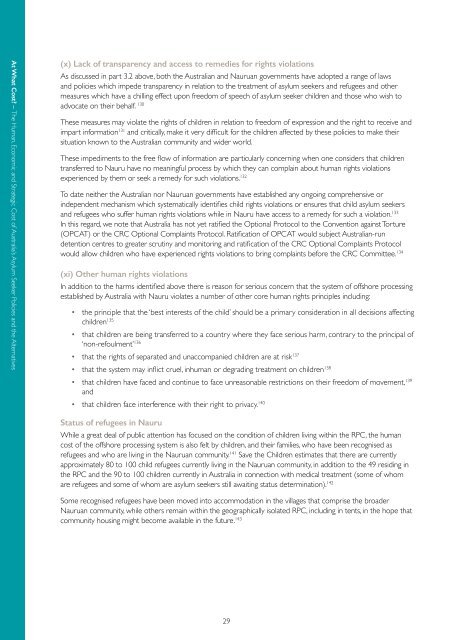AT WHAT COST?
At-What-Cost-Report-Sept-2016
At-What-Cost-Report-Sept-2016
You also want an ePaper? Increase the reach of your titles
YUMPU automatically turns print PDFs into web optimized ePapers that Google loves.
At What Cost? – The Human, Economic and Strategic Cost of Australia’s Asylum Seeker Policies and the Alternatives<br />
(x) Lack of transparency and access to remedies for rights violations<br />
As discussed in part 3.2 above, both the Australian and Nauruan governments have adopted a range of laws<br />
and policies which impede transparency in relation to the treatment of asylum seekers and refugees and other<br />
measures which have a chilling effect upon freedom of speech of asylum seeker children and those who wish to<br />
advocate on their behalf. 130<br />
These measures may violate the rights of children in relation to freedom of expression and the right to receive and<br />
impart information 131 and critically, make it very difficult for the children affected by these policies to make their<br />
situation known to the Australian community and wider world.<br />
These impediments to the free flow of information are particularly concerning when one considers that children<br />
transferred to Nauru have no meaningful process by which they can complain about human rights violations<br />
experienced by them or seek a remedy for such violations. 132<br />
To date neither the Australian nor Nauruan governments have established any ongoing comprehensive or<br />
independent mechanism which systematically identifies child rights violations or ensures that child asylum seekers<br />
and refugees who suffer human rights violations while in Nauru have access to a remedy for such a violation. 133<br />
In this regard, we note that Australia has not yet ratified the Optional Protocol to the Convention against Torture<br />
(OPC<strong>AT</strong>) or the CRC Optional Complaints Protocol. Ratification of OPC<strong>AT</strong> would subject Australian-run<br />
detention centres to greater scrutiny and monitoring and ratification of the CRC Optional Complaints Protocol<br />
would allow children who have experienced rights violations to bring complaints before the CRC Committee. 134<br />
(xi) Other human rights violations<br />
In addition to the harms identified above there is reason for serious concern that the system of offshore processing<br />
established by Australia with Nauru violates a number of other core human rights principles including:<br />
• the principle that the ‘best interests of the child’ should be a primary consideration in all decisions affecting<br />
children 135<br />
• that children are being transferred to a country where they face serious harm, contrary to the principal of<br />
‘non-refoulment’ 136<br />
• that the rights of separated and unaccompanied children are at risk 137<br />
• that the system may inflict cruel, inhuman or degrading treatment on children 138<br />
• that children have faced and continue to face unreasonable restrictions on their freedom of movement, 139<br />
and<br />
• that children face interference with their right to privacy. 140<br />
Status of refugees in Nauru<br />
While a great deal of public attention has focused on the condition of children living within the RPC, the human<br />
cost of the offshore processing system is also felt by children, and their families, who have been recognised as<br />
refugees and who are living in the Nauruan community. 141 Save the Children estimates that there are currently<br />
approximately 80 to 100 child refugees currently living in the Nauruan community, in addition to the 49 residing in<br />
the RPC and the 90 to 100 children currently in Australia in connection with medical treatment (some of whom<br />
are refugees and some of whom are asylum seekers still awaiting status determination). 142<br />
Some recognised refugees have been moved into accommodation in the villages that comprise the broader<br />
Nauruan community, while others remain within the geographically isolated RPC, including in tents, in the hope that<br />
community housing might become available in the future. 143<br />
29


